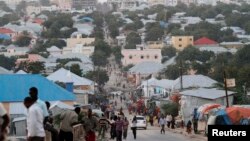Somalia experts and officials say upcoming elections face further delays unless the country's seven-member National Leadership Forum (NLF) takes action.
The Federal Indirect Electoral Independent Team warned Monday there will be more postponements if there is no political agreement on Hiran and Middle Shabelle, the last regional administrations that need to be established before elections can take place.
The president and prime minister, both members of the NLF, expressed differences over the venue of selection of the new region's parliament, with the president proposing Mogadishu and the prime minister insisting it be left within the region.
Both the president and prime minister are presidential candidates.
The formation of this regional administration is a contentious issue because each candidate suspects the other may exploit the process to produce allies who would have a say in the election of the Upper House (by Oct. 10), the Lower House (by Nov. 10) and president (Nov. 30).
Many challenges, candidates
Political differences are just one of the many challenges facing the election: Lack of preparedness, lack of trust, a bloated field of candidates for the two houses of parliament, how to fulfill the women’s quota and a budget shortage are other key stumbling blocks to holding elections.
Abdirashid Hashi is the director of Heritage Institute in Mogadishu. He has been touring the regions, and he says delays are likely because of the regions are unprepared and there are no government structures in place to deal with elections.
“The regions, which are weaker than the capital, have been handed with the tasks,” Hashi said. “This affected the logistics, and they are not prepared.”
He also said a large number of candidates in regional capitals who are seeking a seat have made it harder for the regions and elders to narrow the list of candidates.
“In Garowe, the hotels are full,” he said. “You can't get a reservation. All the politicians have come from the regions, districts and from diaspora, so it's not easy to distribute seats.”
2012 vs 2016
Hashi says the current process is a lot more complicated than the 2012 process, in which only 135 elders were selecting the parliament.
In this election, each of the 275 would-be members of parliament in the lower house will have to compete for the votes of 51 delegates. Each is competing with three to eight candidates for the same votes and must have the support of 26 or 27 of the 51 delegates to be elected.
The NLF increased the number of delegates in order to give the process what it called enhanced legitimacy. But critics say the increased delegate pool of 14,025 encouraged circulation of a large amount of money in the political atmosphere.
“This is enhanced corruption, not enhanced legitimacy,” says a political aide of one of the candidates who requested anonymity.
Unlike 2012, Somalia is setting up a 54-member Upper House of parliament. The members of the Upper House will be selected by the regions. The names will be proposed by regional leaders, then their respective parliaments will have to approve. The challenge is that there isn’t a seat for every clan because of the limited members of the Upper House, unlike the Lower House where all clans must have seats.
Quota for women
One of the biggest challenges in this process is fulfilling the women's 30 percent quota. In 2012, only 14 percent of parliament was given to women (half of the required quota); but this year the women, political leaders and the international community say they expect to see a full allocation. Women must have 81 seats in the Lower House and 15 seats in the Upper House.
Initially the elders were accused of dragging their feet in protecting seats reserved for women, and some women were discouraged. But the biggest setback came Sunday when Somalia's Islamic scholars objected to the move, saying it was against Islam and a foreign-led initiative to reserve a quota for women.
Sheikh Nur Barud Gurhan urged the elders and clans to reject pressure from the politicians and disregard the quota.
“Which laws say that every clan that has three seats reserves one for a woman? Clans can allocate seats to whoever they want,” he said. “Traditional elders cannot be forced, they must say ‘no.’”
But Batulo Ahmed Gaballe, chairperson of Somali Women's Organization said the Islamic scholars’ intervention was surprising and shocking.
“It's not religious. It’s just to deny women their rights to participate in their country's leadership and rebuilding,” she said.
She said the move is driven by politics more than religion and said the opposition to women's participation only comes up during the elections.
The mandate of the government institutions expired weeks ago. Two of the NLF members (president and prime minister) have received "exceptional extension" from the same forum. Opposition candidates who want to compete with them for the top job say their role in the NLF raises conflict of interest. They say the process lacks transparency, and the sooner the elections take place the better.








